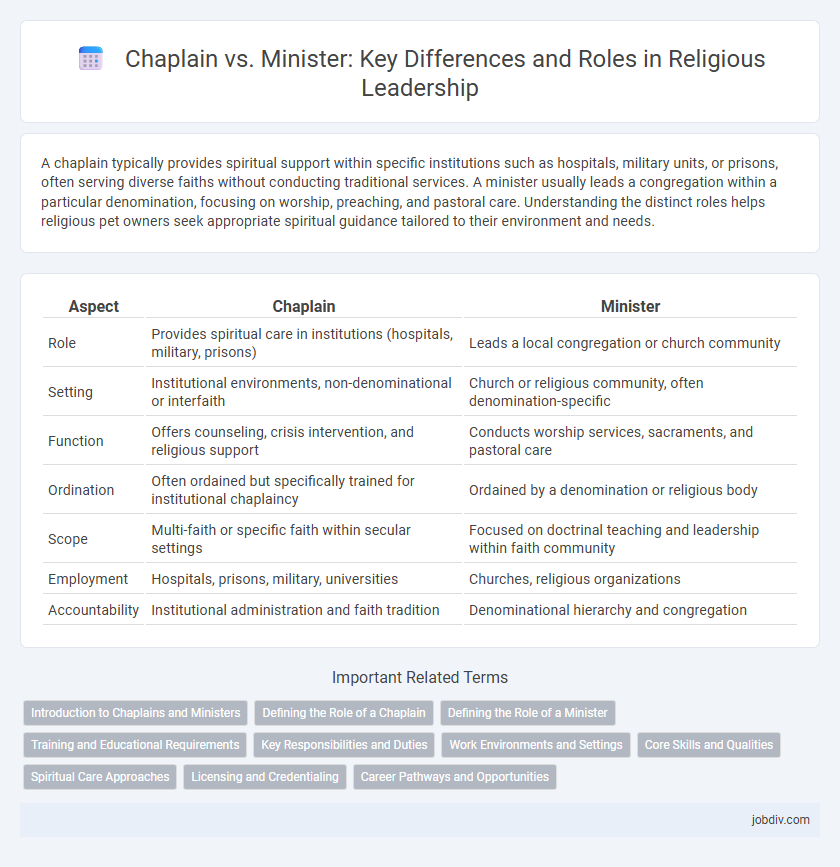A chaplain typically provides spiritual support within specific institutions such as hospitals, military units, or prisons, often serving diverse faiths without conducting traditional services. A minister usually leads a congregation within a particular denomination, focusing on worship, preaching, and pastoral care. Understanding the distinct roles helps religious pet owners seek appropriate spiritual guidance tailored to their environment and needs.
Table of Comparison
| Aspect | Chaplain | Minister |
|---|---|---|
| Role | Provides spiritual care in institutions (hospitals, military, prisons) | Leads a local congregation or church community |
| Setting | Institutional environments, non-denominational or interfaith | Church or religious community, often denomination-specific |
| Function | Offers counseling, crisis intervention, and religious support | Conducts worship services, sacraments, and pastoral care |
| Ordination | Often ordained but specifically trained for institutional chaplaincy | Ordained by a denomination or religious body |
| Scope | Multi-faith or specific faith within secular settings | Focused on doctrinal teaching and leadership within faith community |
| Employment | Hospitals, prisons, military, universities | Churches, religious organizations |
| Accountability | Institutional administration and faith tradition | Denominational hierarchy and congregation |
Introduction to Chaplains and Ministers
Chaplains serve as spiritual caregivers within institutions such as hospitals, military units, prisons, and universities, providing emotional support and religious guidance to diverse populations. Ministers typically lead congregations, conduct worship services, and perform sacraments within specific religious communities or churches. Both roles require theological training, but chaplains often operate in pluralistic environments, while ministers focus primarily on serving their own faith communities.
Defining the Role of a Chaplain
A chaplain serves as a spiritual caregiver within institutions such as hospitals, military units, prisons, or universities, offering pastoral support tailored to diverse populations regardless of religious affiliation. Unlike a minister who typically leads a specific congregation and conducts regular worship services, a chaplain provides inclusive counseling, crisis intervention, and ethical guidance in multifaceted settings. This role emphasizes adaptability and interfaith sensitivity, ensuring emotional and spiritual care meets the needs of a broad community rather than a single faith group.
Defining the Role of a Minister
A minister serves as an ordained leader within a Christian congregation, responsible for preaching, administering sacraments, and providing spiritual guidance to parishioners. Ministers often hold formal theological education and are officially appointed by a church body to lead worship services and conduct religious ceremonies such as weddings and baptisms. Unlike chaplains who typically serve in institutional settings like hospitals or the military, ministers primarily focus on nurturing the spiritual life of their local church community.
Training and Educational Requirements
Chaplains typically require specialized training in pastoral care, often including clinical or military chaplaincy certification, plus an advanced degree in theology or divinity such as a Master of Divinity (MDiv). Ministers usually complete a theological education as well, commonly obtaining a seminary degree, but their training focuses more on congregational leadership and preaching. Both roles demand ordination or endorsement from a recognized religious body, emphasizing spiritual formation and doctrinal knowledge.
Key Responsibilities and Duties
Chaplains provide spiritual care and counseling primarily within institutional settings such as hospitals, military units, or prisons, focusing on support tailored to diverse populations regardless of specific religious affiliation. Ministers typically lead congregations, conducting worship services, preaching, administering sacraments, and performing pastoral care within a particular church or denomination. Both roles involve guiding individuals in faith, but chaplains emphasize interfaith support and crisis intervention, while ministers prioritize community leadership and religious education.
Work Environments and Settings
Chaplains primarily serve in institutional settings such as hospitals, military bases, prisons, and universities, providing spiritual support tailored to diverse populations within these environments. Ministers typically work within church congregations, leading worship, delivering sermons, and managing community religious activities. The chaplain's role emphasizes interfaith support and crisis intervention, while ministers focus on pastoral care and religious instruction within a specific faith tradition.
Core Skills and Qualities
Chaplains specialize in providing spiritual care within institutions such as hospitals, military, or prisons, requiring skills in pastoral counseling, crisis intervention, and interfaith communication. Ministers often lead congregations, emphasizing sermon delivery, community leadership, and religious education. Both roles demand empathy, strong communication, and a deep understanding of religious doctrines, but chaplains prioritize adaptability and confidentiality in diverse, secular settings.
Spiritual Care Approaches
Chaplains provide tailored spiritual care within institutional settings such as hospitals, military units, and prisons, emphasizing interfaith support and emotional resilience. Ministers typically offer faith-specific guidance, focusing on religious rituals, preaching, and community leadership within their congregations. Both roles prioritize holistic well-being but differ in scope, with chaplains adopting a more inclusive, crisis-oriented approach and ministers concentrating on doctrinal teaching and pastoral counseling.
Licensing and Credentialing
Chaplains typically receive certification or endorsement from specific religious organizations or chaplaincy associations, focusing on specialized training in pastoral care within institutional settings like hospitals, military, or prisons. Ministers usually undergo ordination through their denominational bodies, which grants them ecclesiastical authority to lead congregations, administer sacraments, and perform weddings. Licensing and credentialing for chaplains emphasize clinical pastoral education and institutional endorsement, whereas ministers' credentials often depend on denominational ordination processes and local church recognition.
Career Pathways and Opportunities
Chaplains typically serve in specialized settings such as hospitals, the military, prisons, or universities, offering spiritual support tailored to diverse populations, while ministers often lead congregations within religious communities, focusing on preaching, worship, and pastoral care. Career pathways for chaplains frequently require specialized clinical pastoral education (CPE) and endorsement from religious organizations, opening opportunities in institutional environments, whereas ministers pursue ordination through denominational seminaries, leading to roles in church leadership, counseling, and community outreach. Both career tracks offer unique opportunities for leadership, spiritual guidance, and service, with chaplains often working in ecumenical or interfaith contexts and ministers primarily engaged in denominational settings.
Chaplain vs Minister Infographic

 jobdiv.com
jobdiv.com